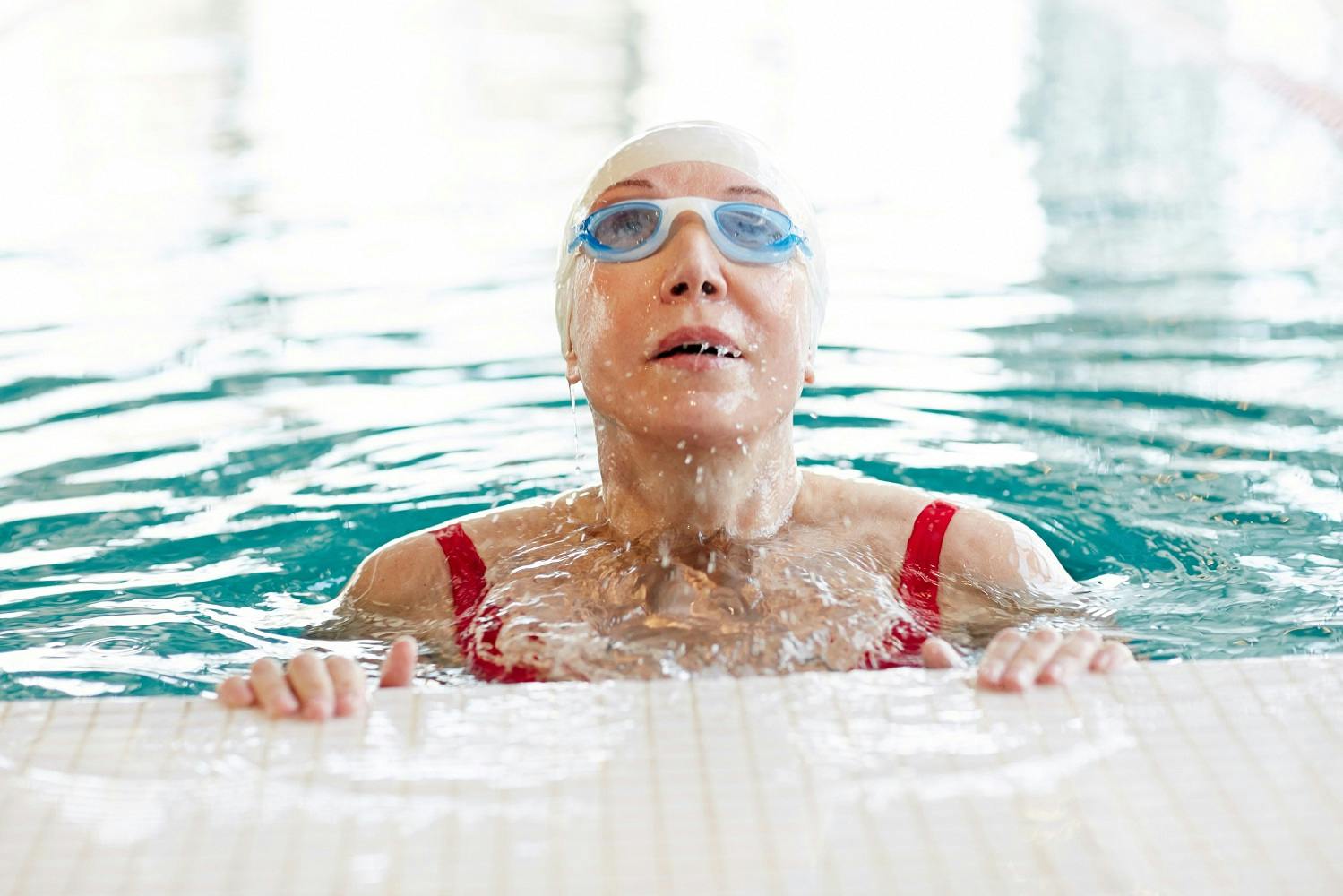
Swimming works the entire body and is one of the best exercises for people of any age. Plus it’s cool, calming…and lots of fun.
Exercise doesn’t have to mean getting hot, sweaty, and achy. In fact, you can avoid all of that with one of the best exercises around – swimming!
Whether your style is doggy paddle or crawl—or just pool walking—exercising in water can help you stay fit. According to the Centers for Disease Control, swimmers have about half the risk of death compared with inactive people.
And there’s no need for a fancy country club membership. You can usually swim on the cheap at a local community pool, lake, or YMCA. Maybe that’s why swimming ranks as the fourth most popular sports activity in the United States.
Check out some of the great benefits of swimming below, and then get ready to get wet.
1. Swimming provides a full-body workout
You don’t have to swim like Michael Phelps to reap the benefits. Swimming at any level is a great workout. “Simply keeping yourself afloat activates the core muscles in your back and abdomen. And you have to move all of your muscles to swim,” said physical therapist Leigh de Chaves in the Harvard Health Letter.
Unlike walking, running, or cycling, swimming activates most of the body’s major muscle groups, including those in the legs, upper body, and core. Swimming combines cardio, strength training (because of the water’s resistance), and stretching (for better flexibility). And because so many of the body’s muscles are working while swimming, the bones get stronger, too, which is particularly important as people age.
2. Water workouts are gentle on the joints
Love that wonderful floaty feeling when you swim? Water’s natural buoyancy reduces the effect of gravity. That makes swimming a non-weight-bearing exercise.
Water’s buoyancy reduces the stress on your joints, making it an ideal activity if you have arthritis – or just want to prevent it. People with achy knees or a bad lower back that makes walking or other land-based activities painful can exercise much more comfortably in water. For the same reasons, swimming can be beneficial for those recovering from injuries or surgery.

3. Swimming is good for your heart
Although you may not feel sweaty (because the water cools you off and washes the sweat away), your body is getting a great aerobic workout when you swim. Regular swimming can help lower blood pressure and relax stiff arteries, reducing the risk of heart disease and stroke. Best of all, swimming delivers all of these benefits without putting as much strain on the body as other aerobic activities.
4. Swimming can reduce the risk of falls
Swimming doesn’t just improve your aerobic fitness. It also improves muscle strength, balance, and coordination, all of which can help prevent falls.
In fact, one Australian study actually found that swimming was the only exercise that helped lower the risk of falls. Researchers compared swimming with several other kinds of exercise, including golf, calisthenics, lawn bowling, and workouts on treadmills or stationary bikes. Over a four-year period, only swimming reduced the participants’ risk of falls.
5. Swimming can help with weight control
Like other forms of cardio, swimming raises your metabolic rate, helping you burn more calories. But the feeling of lightness and coolness that people have in the water makes the workout feel easier. That can be especially helpful for people who avoid exercise because their weight makes it difficult or uncomfortable.
6. Swimming promotes mental health, too
Being in the water is like being in another world, away from everyday stress and anxiety. Swimming solitary laps in a pool can feel quiet and tranquil, even meditative. The rhythmic movements help promote mental relaxation and calm even while the body is working hard.
In contrast, swimming can also be social. Water aerobics can offer a vigorous workout while promoting mental health through social activity. Either way, with swimming, both your body and your mind reap the benefits.
And last but not least. . .
7. Swimming is fun!
Submerging yourself in a pool or lake feels good, and can bring up happy memories of splashing around in the water as a kid. Like all exercises, swimming releases the feel-good hormones called endorphins in your brain, giving you a sense of happiness and well-being. Studies show that people are more likely to stick with an exercise program if they enjoy it. About half of the people who start a new exercise regimen quit within a few months, but swimmers are more likely to stick with it.
Haven’t swum in a while?
You don’t need much equipment to start swimming, other than a swimsuit that lets you move comfortably and maybe a pair of goggles to protect your eyes and let you see underwater. Most swimming pools will require you to wear a swim cap as well.
If you’re just starting out, it’s best to start slow. One expert recommends that people who haven’t been swimming in a while start with 30-minutes three times a week, with frequent breaks. “You want to ease into it and build up,” said David Tanner, a research associate at Indiana University and co-editor of an educational handbook on the science of swimming, in Time.com.
Finally, if you never learned how to swim or could use a refresher, consider taking lessons. You can find adult swimming lessons near you from the American Red Cross website. And if lap swimming isn’t your thing, you can sign up for water aerobics classes, or even try water walking or jogging, which doesn’t require any special training. Make sure there are lifeguards present wherever and whenever you are swimming.
Although swimming is generally a safe way for people of all ages and fitness levels to exercise, it’s always smart to talk to your doctor before starting a new exercise routine.
How Medicare Can Help
Need help getting started with exercise? Some Medicare Advantage plans offer SilverSneakers, a program that allows you access to certain gyms and fitness classes. To find out if your plan offers SilverSneakers, or to find a new plan that best fits your needs, check out our easy-to-use plan finder tool.
Additional resources
- ClearMatch Medicare: Find a Medicare Plan
- Centers for Disease Control & Prevention: Health Benefits of Swimming
- Harvard Medical School: Simplify Your Workout with Lap Swimming
- National Library of Medicine: Swimming and the Rate of Falls in Older Men
- Time: Why Swimming Is So Good For You



